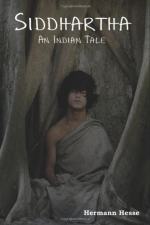From this petrified state, he was awoken by a hand touching his shoulder. Instantly, he recognised this touch, this tender, bashful touch, and regained his senses. He rose and greeted Vasudeva, who had followed him. And when he looked into Vasudeva’s friendly face, into the small wrinkles, which were as if they were filled with nothing but his smile, into the happy eyes, then he smiled too. Now he saw the bananas lying in front of him, picked them up, gave one to the ferryman, ate the other one himself. After this, he silently went back into the forest with Vasudeva, returned home to the ferry. Neither one talked about what had happened today, neither one mentioned the boy’s name, neither one spoke about him running away, neither one spoke about the wound. In the hut, Siddhartha lay down on his bed, and when after a while Vasudeva came to him, to offer him a bowl of coconut-milk, he already found him asleep.
OM
For a long time, the wound continued to burn. Many a traveller Siddhartha had to ferry across the river who was accompanied by a son or a daughter, and he saw none of them without envying him, without thinking: “So many, so many thousands possess this sweetest of good fortunes—why don’t I? Even bad people, even thieves and robbers have children and love them, and are being loved by them, all except for me.” Thus simply, thus without reason he now thought, thus similar to the childlike people he had become.
Differently than before, he now looked upon people, less smart, less proud, but instead warmer, more curious, more involved. When he ferried travellers of the ordinary kind, childlike people, businessmen, warriors, women, these people did not seem alien to him as they used to: he understood them, he understood and shared their life, which was not guided by thoughts and insight, but solely by urges and wishes, he felt like them. Though he was near perfection and was bearing his final wound, it still seemed to him as if those childlike people were his brothers, their vanities, desires for possession, and ridiculous aspects were no longer ridiculous to him, became understandable, became lovable, even became worthy of veneration to him. The blind love of a mother for her child, the stupid, blind pride of a conceited father for his only son, the blind, wild desire of a young, vain woman for jewelry and admiring glances from men, all of these urges, all of this childish stuff, all of these simple, foolish, but immensely strong, strongly living, strongly prevailing urges and desires were now no childish notions for Siddhartha any more, he saw people living for their sake, saw them achieving infinitely much for their sake, travelling, conducting wars, suffering infinitely much, bearing infinitely much, and he could love them for it, he saw life, that what is alive, the indestructible, the Brahman in each of their passions, each of their acts. Worthy of love and admiration




